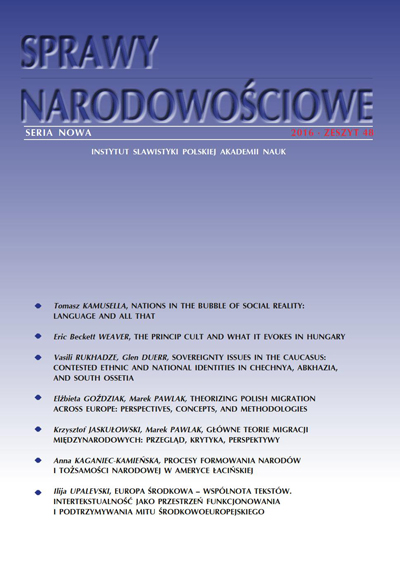Tracing the decline of Yugoslav identity: a case for ‘invisible’ ethnic cleansing
Tracing the decline of Yugoslav identity: a case for ‘invisible’ ethnic cleansing
Author(s): Hana SrebotnjakSubject(s): Social Sciences, Sociology, Ethnic Minorities Studies
Published by: Instytut Slawistyki Polskiej Akademii Nauk
Keywords: Post-Yugoslavia; invisible ethnic cleansing; identity loss; nationalism; politics of memory; historical amnesia; Yugonostalgia
Summary/Abstract: This essay explores the concept of invisible ethnic cleansing by examining the remaining group of self-identifying Yugoslavs who continue to identify themselves as such despite the break-up of Yugoslavia, the country that shaped and constituted the focal point of their identity. The analysis argues that the lack of recognition of the Yugoslav identity during the country’s disintegration as well as afterwards in the individual republics befitted the new nationalistic and distinctly anti-Yugoslav narratives adopted by individual post-Yugoslav republics. The sheer existence and acknowledgment of the Yugoslav identity could therefore disprove the new nationalistic tenets. The essay begins by setting up an analytical framework for the study of invisible ethnic cleansing and Yugoslav identity by examining the concepts of ethnic cleansing, nationalism, group destruction and ethnicity. It goes on to establish the historical background for Yugoslavia’s break up and looks at Yugoslavia’s ‘nationalities policy’, the break up itself and the role of the West and the Western media. Finally, the study identifies the hegemonic power of current nation-states reflected in the media, education and government-sponsored intellectual efforts, as those that control the image of the past can erase from it the memory of the disappeared states and the identities connected to them. The bulk of the analysis and the conclusions drawn were based on personal memoires and accounts of self-identifying Yugoslavs in order to preserve the memories of marginalized and forgotten groups as well as to stress the importance of counter-memory, which can challenge the narrative promoted by dominant groups and oppressive states. Moreover, the novel concept of invisible ethnic cleansing introduced will allow scholars to examine the loss of supranational identities, which accompany the dissolutions of multinational states.
Journal: Sprawy Narodowościowe
- Issue Year: 2016
- Issue No: 48
- Page Range: 65-84
- Page Count: 20
- Language: English

